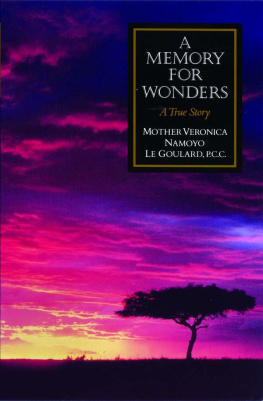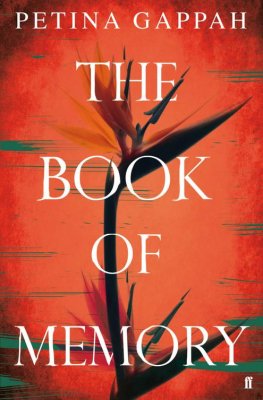Mother Veronica Namoyo Le Goulard - A Memory for Wonders: A True Story
Here you can read online Mother Veronica Namoyo Le Goulard - A Memory for Wonders: A True Story full text of the book (entire story) in english for free. Download pdf and epub, get meaning, cover and reviews about this ebook. year: 1993, publisher: Ignatius Press, genre: Non-fiction. Description of the work, (preface) as well as reviews are available. Best literature library LitArk.com created for fans of good reading and offers a wide selection of genres:
Romance novel
Science fiction
Adventure
Detective
Science
History
Home and family
Prose
Art
Politics
Computer
Non-fiction
Religion
Business
Children
Humor
Choose a favorite category and find really read worthwhile books. Enjoy immersion in the world of imagination, feel the emotions of the characters or learn something new for yourself, make an fascinating discovery.
- Book:A Memory for Wonders: A True Story
- Author:
- Publisher:Ignatius Press
- Genre:
- Year:1993
- Rating:5 / 5
- Favourites:Add to favourites
- Your mark:
- 100
- 1
- 2
- 3
- 4
- 5
A Memory for Wonders: A True Story: summary, description and annotation
We offer to read an annotation, description, summary or preface (depends on what the author of the book "A Memory for Wonders: A True Story" wrote himself). If you haven't found the necessary information about the book — write in the comments, we will try to find it.
A Memory for Wonders: A True Story — read online for free the complete book (whole text) full work
Below is the text of the book, divided by pages. System saving the place of the last page read, allows you to conveniently read the book "A Memory for Wonders: A True Story" online for free, without having to search again every time where you left off. Put a bookmark, and you can go to the page where you finished reading at any time.
Font size:
Interval:
Bookmark:
A Memory for Wonders
Mother Veronica Namoyo Le Goulard, P.C.C.
A Memory for Wonders
A True Story
Foreword by Mother Mary Francis, P.C.C.
IGNATIUS PRESS SAN FRANCISCO
Cover design by Roxanne Mei Lum
Cover photograph by John Hawkins / Tony Stone Worldwide
1993 Ignatius Press, San Francisco
All rights reserved
ISBN 978-0-89870-430-3
Library of Congress catalogue number 92-74110
Contents
I
II
III
IV
V
VI
VII
VIII
IX
X
XI
XII
XIII
XIV
XV
XVI
XVII
XVIII
Foreword
Why does one write an autobiography? There would need to be a driving force. And there are variants on that. To present oneself in neon lights, because one is a celebrity of sorts, could perhaps net one spending money usque in saeculum , although the saeculum itself might well be rendered dubious. Then, there could be the noncelebrity outstandingly unequipped as a writer who is irresistibly drawn to discourse by pen on that fascinating subject of self to the extent of several volumes, from which the world is saved by reason of a notable want of enthusiasm in the publishing world. And then there is also the one who writes an autobiography in painful humility, so that the world may know the wonders of God. This is such a work. We can be grateful that such wonders of God as are here revealed are confided to us by one who is already a writer of distinction.
All human lives are mysteries of Gods love. And, in the deepest sense, while hidden in the folds of each ones being, they yet belong to the whole Mystical Body of Christ of which we are all members. Some lives are perhaps somewhat more astonishingly mysterious than others, at least in the sense of being more surprising. The life of Mother Veronica Namoyo Le Goulard is one of these. Having entered the Poor Clare monastery in Algiers at the age of twenty-two, after a life than can hardly be described as less than amazing by anyone, Lucette Le Goulard later became the abbess there and went on to found a monastery of Poor Clares in Lilongwe, Malawi, a monastery now abounding in members and world-famous for its intelligently grace-directed and therefore successful inculturation.
After a silvery span of years as abbess in Malawi, Mother Veronica Namoyo returned to France in happy anticipation of ending her earthly days in a deeply hidden life of contemplation. She had hoped that Gods grace would achieve a fully native community in Malawi by that time, and her hope had not been confounded. Her hope for disappearing from the eyes of men, however, was less notably fulfilled. For she was soon recalled by Rome to Africa, this time to refound a dying community in Lusaka. Abbess there for many years, during which the reestablishment of a healthy Poor Clare enclosed contemplative life was well realized, she then insisted that the abbatial leadership be entrusted to a native African. It was in this Lusaka monastery that Mother Veronica Namoyo then continued her invaluable services to God and the Church and the Order of Poor Clares as vicaress and novice mistress and first councilor of an African Federation of Poor Clares, having earlier been the first federal abbess of the initial federation there.
Lucette was given the name Veronica at her Poor Clare investiture. To this was well added by an African archbishop the descriptive name Namoyo, that is, the life-bringer. It is an apt description of the woman who bears it. The first native African abbesses in Lilongwe and Lusaka are the two whom Mother Veronica Namoyo received as her first postulants.
This autobiography was written at the more than earnest request of the African abbess in Lusaka as being the only gift she desired for the celebration of her silver jubilee several years ago. It was intended to be a private gift reserved to the community in Lusaka. I entered the scene when Mother Veronica Namoyo, one of my dearest friends, entrusted the manuscript to me for some editing. A native Frenchwoman who has had limited opportunities to exercise her writing and speaking of English these many years past in Africa, she felt the writing needed perhaps some grammatical surveillance. When I realized what a treasure was in my hands, what a dazzling exposition of Gods amazing work, I joined forces with Mother Josefa, the young African abbess in Lusaka, to persuade Mother Veronica Namoyo to allow me to submit it for publication. Mother Veronica Namoyo fought a very good initial fight against this proposal.
Part of my own service as federal abbess of the United States of America Federation of Mary Immaculate was to invite some British Poor Clare abbesses, two of them officers of the Association of Poor Clares in England, as guests to our federation chapter held in Roswell in 1987. Permission was readily obtained from higher authority to make this enriching exchange and interchange possible. The invitation was also extended to the English-speaking abbess president of the Poor Clare Federation in Africa (who was unable to accept it) and to the first federal councilor there, who, happily for us, was able to accept it. This was Mother Veronica Namoyo.
One afternoon during the chapter days in Roswell, I sat alone with Mother Veronica in our modest office room to engage in a serious debate. Long one in spirit, heart and ideal, and usually in opinions also, we now found ourselves at direct odds. I felt that this autobiography entrusted to me in a special way could not be withheld from a wide reading public. Mother Veronica would have none of this. It was private. It was not for distribution. It was assuredly not for publication. We sat for a while in a confrontational silence, words dropping away before a direct, if silent, slamming of two disparate ideas, the one against the other. Then, finally, I spoke again.
Mother Veronica Namoyo has long been very kind in her assessments of my own poetry, rejoicing my heart with her understanding of whatever it is I have tried to express. I thanked her again for this and recalled to her that, if one is going to write anything even resembling true poetry, one must agree to be very poor. Poetry reveals the inmost soul and heart of the singer, if it is poetry at all. If one writes poetry, one must give oneself away. I reminded Mother Veronica Namoyo, too, of the great attraction God had long since given her to profound poverty. Having long and faithfully responded to this attraction of grace in ways made clear in this autobiography, I asked by what right before God she could keep this manuscript for herself and a few. I inquired how she would justify keeping secret such wondrous works of God as could draw many souls to fall down in adoration before the wonder of his ways. I saw what she had written as an evident channel of grace for many and asked her to relinquish any ownership of the works of God in her life. I suggested that this might be the epitome of poverty to which God had invited herto abdicate that last holding.
Mother Veronica bent her head. After a few moments she said, I trust you absolutely. I will do it. I hold that moment as among the most cherished of my life.
So, here is the relinquishing of her privacy in a truly marvelous tale of Gods grace. We would doubtless prefer that it not end at the enclosure doors of a Poor Clare monastery in Africa. We would like to know all about the ongoing wonders of grace in her life as a cloistered contemplative Poor Clare nun. Yet on this I would never debate nor even attempt to persuade. Perhaps when her earthly course is run, some others will write of her Poor Clare life. After her insistence on leaving the service of abbess in favor of a native African Poor Clare for some years, the native Africans insisted on reclaiming their first spiritual mother. Once again abbess in Lusaka, Mother Veronica Namoyo goes on doing what she has always done since first struck down by grace when she was three years old: worshipping God and inviting with irresistible sincerity and love others to do the same.
Next pageFont size:
Interval:
Bookmark:
Similar books «A Memory for Wonders: A True Story»
Look at similar books to A Memory for Wonders: A True Story. We have selected literature similar in name and meaning in the hope of providing readers with more options to find new, interesting, not yet read works.
Discussion, reviews of the book A Memory for Wonders: A True Story and just readers' own opinions. Leave your comments, write what you think about the work, its meaning or the main characters. Specify what exactly you liked and what you didn't like, and why you think so.












